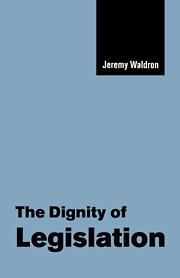1 - Introduction
Published online by Cambridge University Press: 15 December 2009
Summary
I shall not say much by way of introduction to this volume or elaboration of my title. I believe that legislation and legislatures have a bad name in legal and political philosophy, a name sufficiently disreputable to cast doubt on their credentials as respectable sources of law. Whether or not this disrepute is justly earned by the antics of the past or present membership of the British House of Commons, say, or the two houses of the US Congress is an issue on which I shall say nothing. For the problem I see is that we have not even developed a normative theory of legislation that could serve as a basis for criticizing or disciplining such antics. More importantly, we are not in possession of a jurisprudential model that is capable of making normative sense of legislation as a genuine form of law, of the authority that it claims, and of the demands that it makes on the other actors in a legal system.
Our silence on this matter is deafening compared with our philosophical loquacity on the subject of courts. There is nothing about legislatures or legislation in modern philosophical jurisprudence remotely comparable to the discussion of judicial decision-making. No one seems to have seen the need for a theory or idealtype that would do for legislation what Ronald Dworkin's model judge, “Hercules,” purports to do for adjudicative reasoning.
Indeed the situation may be even worse than this; it is certainly worse in America. Not only do we not have the normative or aspirational models of legislation that we need, but our jurisprudence is pervaded by imagery that presents ordinary legislative activity as deal-making, horse-trading, log-rolling, interest-pandering, and pork-barreling - as anything, indeed, except principled political decision-making.
- Type
- Chapter
- Information
- The Dignity of Legislation , pp. 1 - 6Publisher: Cambridge University PressPrint publication year: 1999

